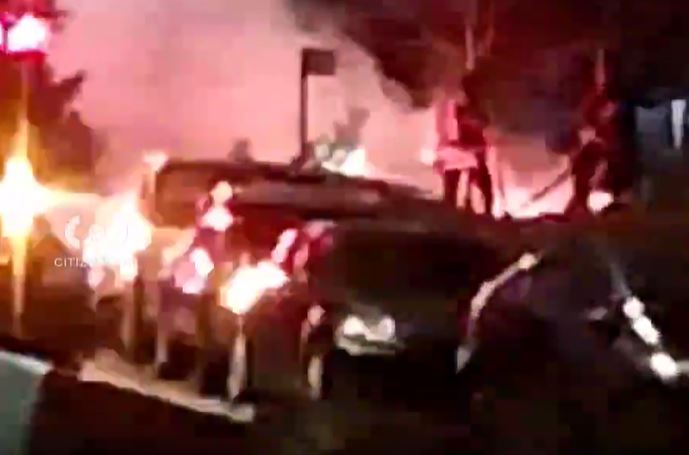
Photo courtesy of the Citizens’ App
No injuries were reported following an early morning brush fire in Norwood, FDNY officials said. A brush fire is a fire involving low-growing plants (such as scrub and brush).
A fire department spokesperson said the department received a call at 10.26 p.m. at 3320 Reservoir Oval East and Holt Place for a report of a brush fire.
They said fire units responded to the scene and the incident was closed at 11.16 p.m. with no reported injuries.
NYS Department of Environmental Conservation (DEC) Commissioner Basil Seggos reminded New Yorkers on March 16 of the start of the annual statewide ban prohibiting residential brush burning. Since 2009, DEC officials said the agency enforces the annual brush burning ban from March 16 through May 14 to prevent wildfires and protect communities during heightened conditions for wildfires.
“Last month, DEC encouraged everyone to be extra vigilant when burning brush because of the risk for wildfires caused by early dry conditions, but starting this Saturday, March 16, it will be illegal to burn brush for the next two months,” Seggos said. “Due to the drier and warmer winter, New York State is at a greater risk for wildfires this spring. This ban is essential to protecting communities and natural resources, as well as the Rangers and other firefighters called to extinguish the wildfires.”
DEC officials saidtthat on March 16, even though some areas of the state remained blanketed in snow, warming temperatures could quickly cause wildfire conditions to arise. They said open burning of debris is the single-largest cause of spring wildfires in New York State, and that when temperatures warm and the past fall’s debris and leaves dry out, wildfires can start and spread easily, further fueled by winds and a lack of green vegetation.
DEC officials said each year, DEC forest rangers extinguish dozens of wildfires that burn hundreds of acres. In addition, they said local fire departments, many of which are staffed by volunteers, all too often have to leave their jobs and families to respond to wildfires caused by illegal debris fires. They said DEC’s Fire Danger Map for the 2024 fire season displays each region’s potential fire risk.
They said New York first enacted strict restrictions on open burning in 2009 to help prevent wildfires and reduce air pollution, and added that the regulations allow residential brush fires in towns with fewer than 20,000 residents during most of the year, but prohibit such burning in spring when most wildfires occur.
They said backyard fire pits and campfires less than three feet in height and four feet in length, width, or diameter are allowed, as are small cooking fires. They said only charcoal or dry, clean, untreated, or unpainted wood can be burned, and people should never leave these fires unattended and must extinguish them. They said burning garbage or leaves is prohibited year-round in New York State.
For more information about fire safety and prevention, go to DEC’s FIREWISE New York webpage.
Forest Rangers, DEC Environmental Conservation Police Officers (ECOs), and local authorities enforce the burn ban. Violators of the State’s open burning regulation are subject to criminal and civil enforcement actions, with a minimum fine of $500 for a first offense. For search and rescue, reporting a wildfire or illegal activity on state lands and easements, call 1-833-NYS-RANGERS (1-833-697-7264). To report environmental law violations, call 1-844-DEC-ECOs (1-844-332-3267).




